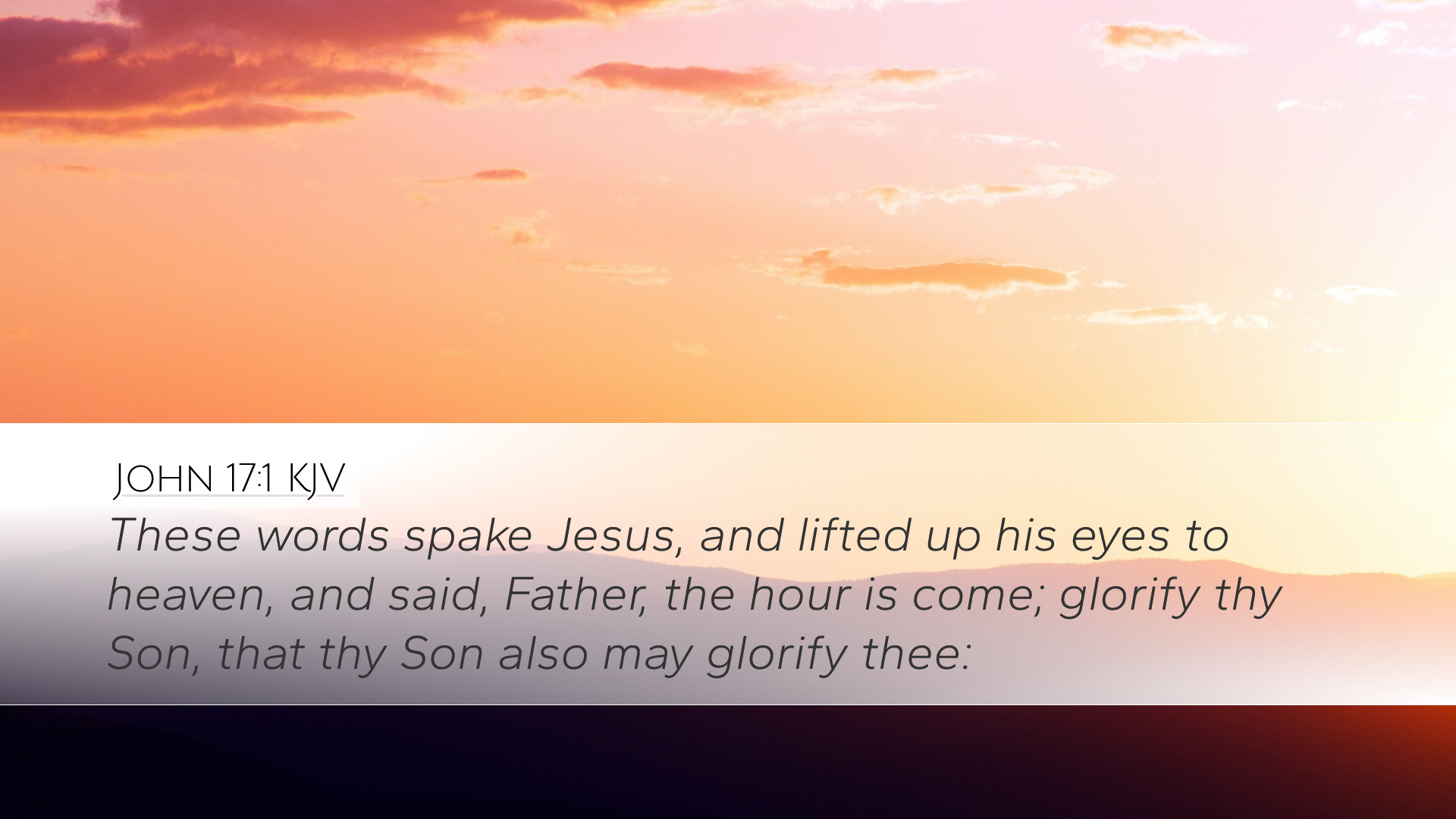Old Testament
Genesis Exodus Leviticus Numbers Deuteronomy Joshua Judges Ruth 1 Samuel 2 Samuel 1 Kings 2 Kings 1 Chronicles 2 Chronicles Ezra Nehemiah Esther Job Psalms Proverbs Ecclesiastes Song of Solomon Isaiah Jeremiah Lamentations Ezekiel Daniel Hosea Joel Amos Obadiah Jonah Micah Nahum Habakkuk Zephaniah Haggai Zechariah MalachiJohn 17:1
John 17:1 KJV
These words spake Jesus, and lifted up his eyes to heaven, and said, Father, the hour is come; glorify thy Son, that thy Son also may glorify thee:
John 17:1 Bible Commentary
Commentary on John 17:1
John 17:1 (KJV): "These words spake Jesus, and lifted up his eyes to heaven, and said, Father, the hour is come; glorify thy Son, that thy Son also may glorify thee."
Introduction
This verse introduces the High Priestly Prayer of Jesus, marking a pivotal moment in the Gospel of John. Here, we witness the Son of God communicating directly with the Father. This prayer encapsulates the essence of Christ's mission and the intimate relationship that exists within the Trinity.
Contextual Analysis
To understand the weight of this verse, it is essential to consider the context in which Jesus speaks. This moment occurs just before His crucifixion, indicating the seriousness of His impending sacrifice and the fulfillment of His redemptive purpose.
According to Matthew Henry, the hour that Jesus refers to signifies the appointed time for His suffering and exaltation. The pronouncement "the hour is come" emphasizes a preordained plan, allowing readers to see the sovereignty of God in the unfolding of salvation history.
Glorification of the Son and the Father
-
Adam Clarke interprets "glorify thy Son" as a request for the Father to vindicate Jesus through His resurrection and ascension. Clarke emphasizes that glory here also includes the recognition of Jesus' divine authority.
-
Albert Barnes points out that the glory conferred upon Jesus will also result in glorifying the Father. This mutual glorification showcases the unity within the Godhead and illustrates the reciprocal nature of their relationship.
The Significance of Lifting Up Eyes
The act of Jesus lifting His eyes to heaven is powerful and significant. It reflects humility and submission to the Father’s will. As noted by Barnes, this posture is characteristic of prayer, indicating a direct communion between the Son and the Father. It exemplifies the nature of sincere prayer that seeks divine intervention and acknowledgment of God’s sovereignty.
The Concept of "Hour"
The meaning of "the hour is come" is critical to understanding Jesus's mission. According to Henry, this hour signifies the culmination of Christ's journey—His crucifixion, resurrection, and ascension. It stresses that time is essential in God’s redemptive plan. This moment links back to John 12:23, where Jesus states, “The hour is come that the Son of man should be glorified.” This connection illustrates the foreknowledge of Christ regarding His mission and the divine timetable established by God.
Theological Implications
-
Firstly, Jesus’ dependence on the Father is evident. The relationship between the Son and the Father underlines a fundamental aspect of Christian theology: the intimate and interdependent nature of the Triune God. As Clarke notes, the glorification of the Son emphasizes His divinity and humanity, showcasing the fullness of God manifested in Jesus.
-
Secondly, this verse raises profound implications for Christology. Jesus' plea to be glorified alongside the Father demonstrates His dual nature, affirming both His equality with the Father and His submission to the Father’s will. This truth is central to orthodox Christian belief and has been a point of theological exploration throughout church history.
-
Lastly, the prayer serves as a model for believers. Just as Jesus prayed for His glorification to fulfill His mission, Christians are called to live lives that reflect God’s glory. This verse invites pastors and theologians to explore how believers can participate in the work of glorifying God through their actions and lives.
Application for Pastors and Theologians
For pastors and theologians, John 17:1 serves as a foundation for understanding the nature of prayer and the importance of seeking God’s glory above all. It challenges believers to deeply reflect on the relationship between prayer, glorification, and God’s ultimate purpose in their lives.
Moreover, this verse can be instrumental in developing a theology of ministry that prioritizes the glorification of God in the church’s practices, teachings, and community life. The prayer of Jesus encourages leaders to model their prayers and ministry after Christ, seeking both personal and corporate glorification of God.
Conclusion
John 17:1 is a profound verse that captures the essence of Jesus's mission, the depth of His relationship with the Father, and serves as a model for believers. Through insights from Matthew Henry, Albert Barnes, and Adam Clarke, we gain a multi-faceted understanding of glorification, prayer, and the divine timeline in God’s redemptive history. As we reflect on this verse, may we be inspired to live in a way that aligns our lives with God’s will and brings glory to Him.


